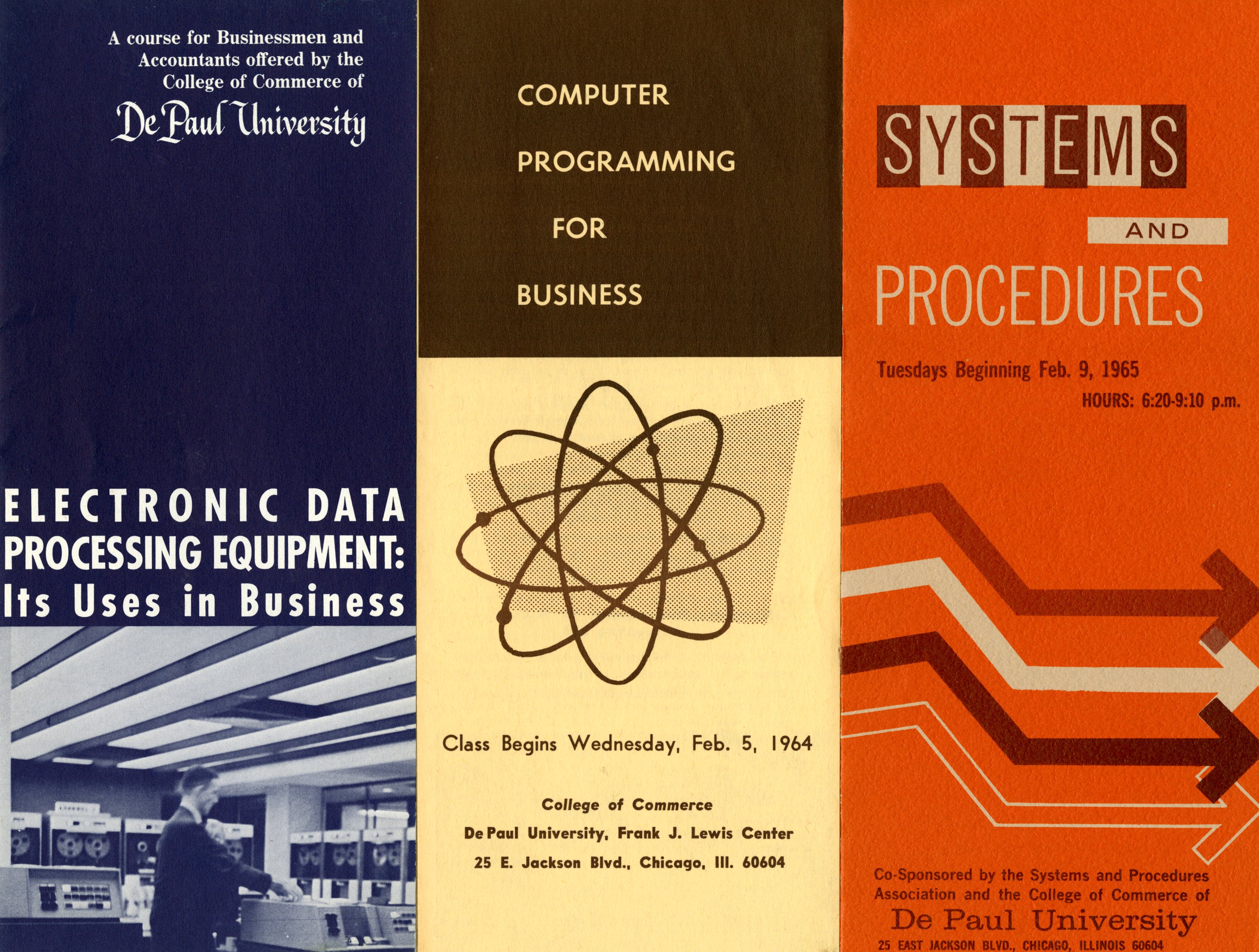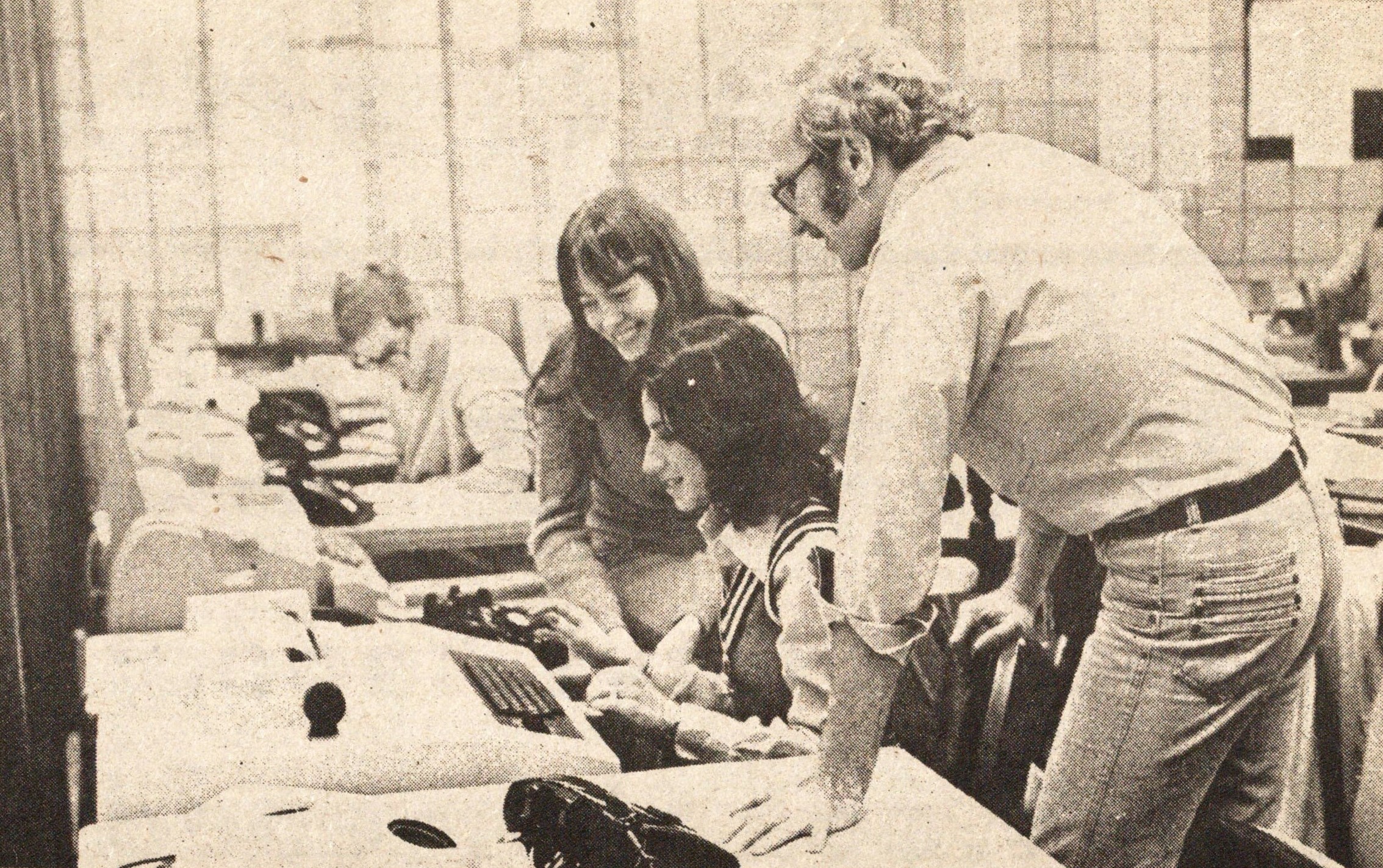 A series of brochures advertising computer science courses in the College of Commerce during the 1960s. (Image courtesy of Special Collections and Archives)
A series of brochures advertising computer science courses in the College of Commerce during the 1960s. (Image courtesy of Special Collections and Archives)This year marks two anniversaries for computer science at DePaul. In 1971, the university announced a commitment to the advancement of computer science education, marking the start of a computer science requirement for some majors. In the decade that followed, computer science course offerings expanded and student interest increased, eventually leading to the formal establishment of the Department of Computer Science in 1981. This month, Into the Archives will trace the evolution of computer science at DePaul to recognize these milestones.
The roots of computer science at DePaul can be traced at least as far back as the 1950s, to an electronic accounting course offered in the College of Commerce. Designed as part of the Accountancy program, the course covered topics such as electronic data processing and the principles of programming and included “opportunities for observing the actual operation of various types of computers."
In the 1960s, the number of computer course offerings expanded beyond this single class when DePaul offered several courses in the accountancy and management programs. A series of brochures from the decade advertise them as meant for “businessmen and accountants." Around that time, the Department of Mathematics began offering a computer programming class. While these early courses taught students about computers and computer use, they were not required courses for their programs. Many focused on teaching the theory and principles of computer use, and less about technical practice.
On Sept. 24, 1971, the Rev. John T. Richardson, C.M., then executive vice president of the university, sent a memo to faculty announcing DePaul's commitment to computer instruction and research. The memo outlined the university's short- and long-term plans for improving computer services, including curriculum changes to require computer-based instruction, a consolidated budget for computer services and equipment, and faculty training.
The impact of the initiative announced in that memo was swift. Beginning in the 1971-72 academic year, computer science courses became a requirement for all College of Commerce majors. A consolidated Academic Computer Services Department launched, which eventually ran labs at both the Loop and Uptown campuses to support the use of two computer systems: an IBM 370 and a Hewlett-Packard “Mini" computer. By the close of the 1976-77 academic year, the Department of Mathematics submitted a proposal for a Bachelor of Science degree in computer science, which the University Senate quickly approved. The success of that degree program led to the introduction of a master's the following year.
 Computer science students work with an instructor in the Uptown computer room in 1979. (Image courtesy of Special Collections and Archives)
Computer science students work with an instructor in the Uptown computer room in 1979. (Image courtesy of Special Collections and Archives)In July 1981, recognizing the rapidly increasing relevance of these degree programs and notable enrollment gains, computer science split from mathematics and became its own department in the College of Liberal Arts and Sciences. Helmut Epp, then director of the computer science degree programs, became the founding chairman of the new department.
Epp recruited David Miller to join the Department of Computer Science in its founding year as the new school's first associate dean. In 2008, DePaul renamed the school as the College of Computing and Digital Media. Since then, Miller has overseen its organization into three schools—Computing, Cinematic Arts, and Design. Today there are roughly 24 degree programs in the School of Computing.
Jenny Piane (BS '00, MS '08, MS '12) is a current student in the School of Computing pursuing a Ph.D. in computer and information sciences. Fifty years ago, her mother, Ruth Weldon (BS '73, MS '90), took one of DePaul's first programming courses, a Fortran class offered as a math elective.
“The course I took got me more interested, so when I graduated with my math degree in 1973, I was looking to stay in the field," Weldon says.
Back then, the information technology industry was beginning to grow, but access was difficult, especially for women.
“At the time I graduated, women really had to prove themselves in non-traditional roles in the workplace," Weldon says. “While job searching, I was asked about my typing and shorthand skills, even though I had majored in mathematics. Eventually I found an entry level programming job at Allstate Insurance, where the computer science skills I'd learned at DePaul enabled me to pass the qualifying tests."
Piane, who completed her undergraduate degree and two master's degrees at DePaul, decided to pursue her doctorate to conduct research that interested her while continuing to work with her thesis advisors, Jacob Furst and Daniela Raicu. She was able to do that because of the program's flexibility.
“A big reason for choosing DePaul is the university's willingness to support part-time Ph.D. students," she says. “It can be difficult to find Ph.D. programs that allow you to have a full-time job, which is unfortunate because it can make getting your Ph.D. later in your career financially unfeasible."
Both women have found success working in the computer science field. Weldon went on to receive a master's in computer science from DePaul in 1990 and her Ph.D. from Nova Southeastern in 2014. She spent 28 years working in the private sector in various IT positions before becoming an assistant professor at the University of St. Francis, where she currently chairs the Department of Computer Science. Piane is a member of the CDM's Visual Informatics and Data Analytics Group, where she researches computer vision. She also works full-time as a senior software engineer at Silgan Closures.
The stories of Weldon and Piane are a testament to the evolution of computer science at DePaul over the years.
“What a privilege it is to know we've been able to educate and have an impact on generations of tech learners," says Miller, now dean for CDM.
Elly Kafritsas-Wessels is the communications manager for the College of Computing and Digital Media . Brittan Nannenga is a university Archivist in the DePaul University Library.